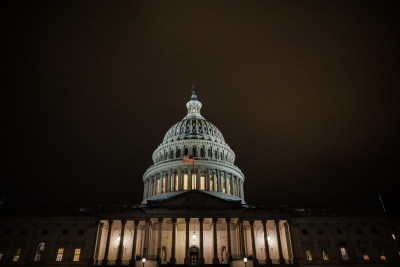For weeks, President Joe Biden has been saying the Build Back Better plan would be “fully paid for” and would not increase the deficit. But the official congressional scorekeeper in its long-awaited final analysis contradicted the president’s claims.

The disagreement between the nonpartisan Congressional Budget Office and the Treasury Department centers on how much revenue could be raised from a provision giving the Internal Revenue Service more enforcement capabilities for tax evaders. Even after the CBO issued its analysis, Biden maintained that the bill, which would establish child care and pre-K programs, expand health care programs, and invest in climate change initiatives among other provisions, “reduces the deficit over the long-term” and is “fully paid for,” as he said in a statement after the House passed the legislation on Nov. 19.
We’ll go through the numbers.
The CBO said in its Nov. 18 report that the House bill, not including revenue from the IRS enforcement provision, would cost $1.7 trillion in spending and bring in $1.3 trillion in revenue over 10 years, adding a net $367 billion to the deficit. But once we factor in a $207.2 billion revenue impact from the IRS provision — a CBO estimate — the net increase to the deficit is $160 billion over 10 years.
The CBO’s report on provisions of the bill under the purview of the Committee on Ways and Means includes the $207.2 billion in the notes section, explaining that under its scorekeeping guidelines, it can’t include the IRS enforcement impact in the estimate of the legislation.
The Treasury Department believes the impact from spending $80 billion over 10 years on increased IRS enforcement on the wealthy would garner about twice that: $400 billion, which, if correct, would make the Build Back Better Act “fully paid for.”
Lawrence Summers, who was an economic adviser to then-President Barack Obama and treasury secretary under then-President Bill Clinton, wrote in an op-ed in the Washington Post on Nov. 17 that even the $400 billion estimate “is far too conservative” and “less than half” what he thought could be raised by such an investment in the IRS. Summers and the Treasury Department have said the tax gap — between what the IRS is owed and what it actually collects — is $7 trillion over the next 10 years.
IRS Commissioner Charles P. Rettig, who was appointed by former President Donald Trump, also wrote in the Washington Post on Nov. 11 that the $400 billion figure is “no surprise.” Rettig said he supported the investment in IRS enforcement, adding that the funding would enable the IRS “to make a sizable dent in noncompliance.”
In a conversation with the Bipartisan Policy Center on Nov. 15, CBO Director Phill Swagel said other more optimistic estimates are “within the possibilities,” and that the research literature on the idea of deterrence — meaning if the IRS is cracking down on tax compliance, people will be more compliant — was “very mixed.” CBO’s analysis, which Swagel has explained before, landed in the center of such research.
“My understanding is that there’s other analyses that put a lot of weight on the idea of deterrence that if people know that the IRS is, is doing more and auditing more that … other people then pay, you know, pay more of their taxes,” Swagel said. “The research literature on this is very mixed.” That literature suggests that companies that see similar companies being audited “sometimes they actually take a more aggressive position” in negotiation with the IRS, he said.
“And so we ended up, as we’ve described in a previous blog post coming down in the middle of that, of that literature on the effects of deterrence on additional revenues,” the CBO director continued. “My understanding is that others take more, either optimistic or aggressive positions, and really see a lot of, a lot of weight on, on deterrence, you know, which again, is within the possibilities, that’s for sure. It’s just not, not as we see it in the center of the research literature.”
On Nov. 19, White House Press Secretary Jen Psaki was asked if, in light of the CBO score, Biden would stop claiming that the Build Back Better legislation doesn’t increase the deficit. Psaki maintained that the bill doesn’t increase the deficit.
“One of the components that experts, Democrats and Republicans, including former heads of the CBO, have pointed to is that IRS, IRS enforcement is not something that there’s a lot of experience in the CBO scoring,” Psaki said. “They still scored it but is undervalued by the assessment of many economists and experts, including people who have been critical of us in the past who estimate, including former treasury secretaries of both parties, who estimate there will be significant savings significantly higher than what is estimated currently. So our assessment and the assessment by many economists out there is that there will be savings over 10 years that will actually reduce the deficit.”
Editor’s note: FactCheck.org does not accept advertising. We rely on grants and individual donations from people like you. Please consider a donation. Credit card donations may be made through our “Donate” page. If you prefer to give by check, send to: FactCheck.org, Annenberg Public Policy Center, 202 S. 36th St., Philadelphia, PA 19104.